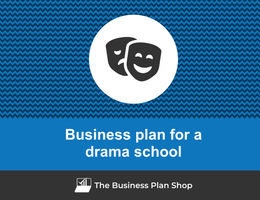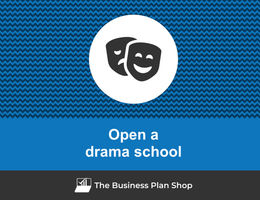How to create a financial forecast for a drama school?
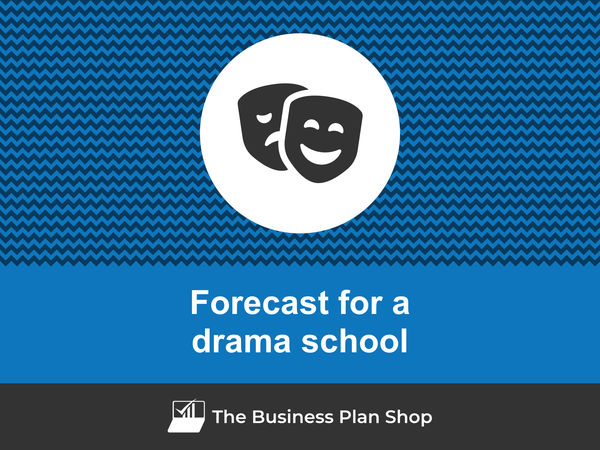
Developing and maintaining an up-to-date financial forecast for your drama school is key in order to maintain visibility on your business’s future cash flows.
If you feel overwhelmed at the thought of putting together a drama school financial forecast then don’t worry as this guide is here to help you.
We'll cover everything from: the main objectives of a financial forecast, the data you need to gather before starting, to the tables that compose it, and the tools that will help you create and maintain your forecast efficiently.
Let's get started!
Why create and maintain a financial forecast for a drama school?
In order to prosper, your business needs to have visibility on what lies ahead and the right financial resources to grow. This is where having a financial forecast for your drama school becomes handy.
Creating a drama school financial forecast forces you to take stock of where your business stands and where you want it to go.
Once you have clarity on the destination, you will need to draw up a plan to get there and assess what it means in terms of future profitability and cash flows for your drama school.
Having this clear plan in place will give you the confidence needed to move forward with your business’s development.
Having an up-to-date financial forecast for a drama school is also useful if your trading environment worsens, as the forecast enables you to adjust to your new market conditions and anticipate any potential cash shortfall.
Finally, your drama school's financial projections will also help you secure financing, as banks and investors alike will want to see accurate projections before agreeing to finance your business.
Need a convincing business plan?
The Business Plan Shop makes it easy to create a financial forecast to assess the potential profitability of your projects, and write a business plan that’ll wow investors.

What information is used as input to build a drama school financial forecast?
A drama school's financial forecast is only as good as the inputs used to build it.
If you are creating (or updating) the forecast of an existing drama school, then you mostly need your accounting information, key historical operating non-financial data, and your team’s input on what to expect for the coming years.
If you are building financial projections for a drama school startup, you will need to have done your research and have a clear picture of your competitive environment and go-to-market strategy so that you can forecast sales accurately.
For a new venture, you will also need a precise list of the resources needed to keep the drama school running on a day-to-day basis and a list of the equipment and expenditures required to start the business (more on that later).
Let's now take a closer look at the elements that make up your drama school's financial forecast.
The sales forecast for a drama school
From experience, it is usually best to start creating your drama school financial forecast by your sales forecast.
To create an accurate sales forecast for your drama school, you will have to rely on the data collected in your market research, or if you're running an existing drama school, the historical data of the business, to estimate two key variables:
- The average price
- The number of monthly transactions
To get there, you will need to consider the following factors:
- Your reputation and brand recognition in the local community can drive up the average price of your drama school's classes, as customers may be willing to pay more for a well-respected and established institution.
- The level of competition in your area can affect the number of monthly transactions, as customers may have more options for drama schools and may be more likely to switch if they find a better deal or program elsewhere.
- The quality and variety of classes you offer can drive both the average price and number of monthly transactions. If you offer unique and high-quality classes, customers may be willing to pay more and attend more frequently.
- The popularity of certain genres or styles of drama can also impact your sales forecast. For example, if musical theater is trending in your area, you may see an increase in demand for those types of classes.
- The availability and qualifications of your instructors can also affect your sales forecast. If you have highly trained and experienced instructors, customers may be willing to pay more for their expertise and instruction.
Once you have an idea of what your future sales will look like, it will be time to work on your overhead budget. Let’s see what this entails.
Need a convincing business plan?
The Business Plan Shop makes it easy to create a financial forecast to assess the potential profitability of your projects, and write a business plan that’ll wow investors.

The operating expenses for a drama school
Once you know what level of sales you can expect, you can start budgeting the expenses required to operate your drama school on a daily basis.
Expenses normally vary based on how much revenue you anticipate (which is why, from experience, it is always better to start your forecast with the topline projection), and where your business is based.
Operating expenses for a drama school will include some of the following items:
- Staff Costs: This includes salaries, benefits, and payroll taxes for all staff members, such as teachers, administrative staff, and maintenance personnel.
- Rent/Lease: You will need to pay rent or lease fees for your drama school's space, whether it is a dedicated building or a shared space.
- Utilities: This covers the cost of electricity, water, and gas for your drama school, as well as any other necessary utilities.
- Marketing and Advertising: You will need to promote your drama school to attract students, which may include expenses for online advertising, print materials, and events.
- Supplies and Materials: This includes the cost of purchasing supplies and materials for your students, such as scripts, costumes, props, and other necessary items.
- Insurance: You will need to insure your drama school against potential risks, such as property damage, liability, and accidents.
- Accountancy Fees: You may choose to hire an accountant to help with your financial records and taxes, which will incur fees.
- Software Licenses: To manage your drama school's operations, you may need to purchase software licenses for programs such as scheduling, accounting, and marketing.
- Professional Development: It is important to invest in the ongoing training and development of your staff to ensure the quality of education at your drama school.
- Building Maintenance: You will need to cover the cost of maintaining and repairing your drama school's building and facilities.
- Banking Fees: This includes fees for processing transactions, such as credit card fees, ATM fees, and wire transfer fees.
- Taxes: You will need to pay various taxes, such as income tax, property tax, and sales tax, depending on your drama school's location and structure.
- Professional Services: You may need to hire outside professionals, such as lawyers or consultants, for specific projects or to provide expertise.
- Student Scholarships/Financial Aid: If your drama school offers scholarships or financial aid to students, you will need to account for these expenses in your budget.
- Travel and Transportation: If your drama school participates in competitions, performances, or other events, you may need to cover travel and transportation expenses for your students and staff.
This list will need to be tailored to the specificities of your drama school, but should offer a good starting point for your budget.
What investments are needed to start or grow a drama school?
Your drama school financial forecast will also need to include the capital expenditures (aka investments in plain English) and initial working capital items required for the creation or development of your business.
For a drama school, these could include:
- Classroom Equipment: This includes items such as desks, chairs, whiteboards, projectors, and other necessary equipment for conducting classes.
- Theater Equipment: This may include lighting and sound equipment, stage curtains, seating, and other items needed for performances and rehearsals.
- Costumes and Props: Drama schools often have a large collection of costumes and props for productions. These items may need to be replaced or updated periodically.
- Facility Maintenance: This includes expenses for general upkeep and repairs of the school building, including plumbing, electrical, and structural repairs.
- Technology Upgrades: As technology continues to advance, drama schools may need to invest in new computers, software, and other technology to keep up with industry standards.
Again, this list will need to be adjusted according to the size and ambitions of your drama school.
Need a convincing business plan?
The Business Plan Shop makes it easy to create a financial forecast to assess the potential profitability of your projects, and write a business plan that’ll wow investors.

The financing plan of your drama school
The next step in the creation of your financial forecast for your drama school is to think about how you might finance your business.
You will have to assess how much capital will come from shareholders (equity) and how much can be secured through banks.
Bank loans will have to be modelled so that you can separate the interest expenses from the repayments of principal, and include all this data in your forecast.
Issuing share capital and obtaining a bank loan are two of the most common ways that entrepreneurs finance their businesses.
What tables compose the financial plan for a drama school?
Now let's have a look at the main output tables of your drama school's financial forecast.
The forecasted profit & loss statement
The profit & loss forecast gives you a clear picture of your business’ expected growth over the first three to five years, and whether it’s likely to be profitable or not.
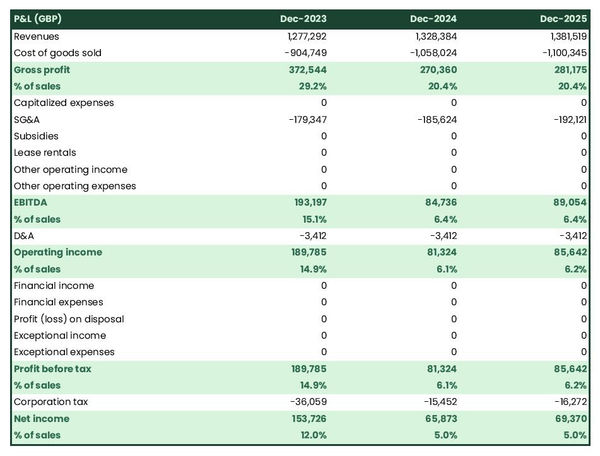
A healthy drama school's P&L statement should show:
- Sales growing at (minimum) or above (better) inflation
- Stable (minimum) or expanding (better) profit margins
- A healthy level of net profitability
This will of course depend on the stage of your business: numbers for an established drama school will look different than for a startup.
The projected balance sheet
The projected balance sheet gives an overview of your drama school's financial structure at the end of the financial year.
It is composed of three categories of items: assets, liabilities and equity:
- Assets: are what the business possesses and uses to produce cash flows. It includes resources such as cash, buildings, equipment, and accounts receivable (money owed by clients).
- Liabilities: are the debts of your drama school. They include accounts payable (money owed to suppliers), taxes due and bank loans.
- Equity: is the combination of what has been invested by the business owners and the cumulative profits to date (which are called retained earnings). Equity is a proxy for the value of the owner's stake in the business.
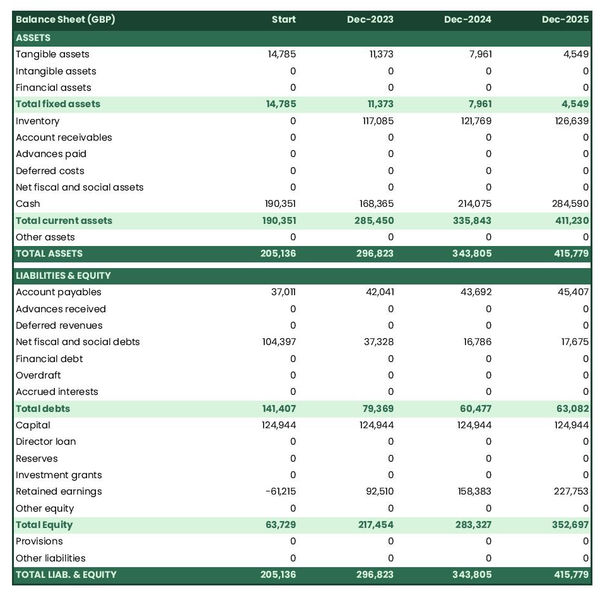
The projected cash flow statement
A projected cash flow statement for a drama school is used to show how much cash the business is generating or consuming.
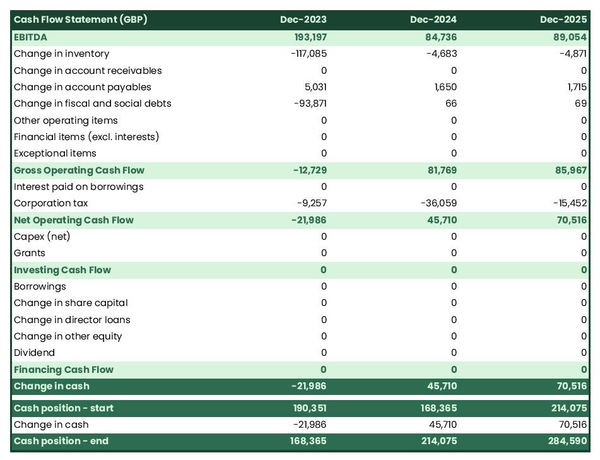
The cash flow forecast is usually organised by nature to show three key metrics:
- The operating cash flow: do the core business activities generate or consume cash?
- The investing cash flow: how much is the business investing in long-term assets (this is usually compared to the level of fixed assets on the balance sheet to assess whether the business is regularly maintaining and renewing its equipment)?
- The financing cash flow: is the business raising new financing or repaying financiers (debt repayment, dividends)?
Cash is king and keeping an eye on future cash flows is imperative for running a successful business. Therefore, you should pay close attention to your drama school's cash flow forecast.
If you are trying to secure financing, note that it is customary to provide both yearly and monthly cash flow forecasts in a financial plan - so that the reader can analyze seasonal variation and ensure the drama school is appropriately capitalised.
Need a convincing business plan?
The Business Plan Shop makes it easy to create a financial forecast to assess the potential profitability of your projects, and write a business plan that’ll wow investors.

Which tool should you use to create your drama school's financial forecast?
Creating your drama school's financial forecast may sound fairly daunting, but the good news is that there are several ways to go about it.
Using online financial forecasting software to build your drama school's projections
The modern and easiest way is to use an online financial forecasting tool such as the one we offer at The Business Plan Shop.
There are several advantages to using specialised software:
- You can easily create your financial forecast by letting the software take care of the financial calculations for you without errors
- You have access to complete financial forecast templates
- You get a complete financial forecast ready to be sent to your bank or investors
- You can easily track your actual financial performance against your financial forecast, and recalibrate your forecast as the year goes by
- You can create scenarios to stress test your forecast's main assumptions
- You can easily update your forecast as time goes by to maintain visibility on future cash flows
- You have a friendly support team on standby to assist you when you are stuck
- It’s cost-efficient and much cheaper than using an accountant or consultant (see below)
If you are interested in this type of solution, you can try our projection software for free by signing up here.
Calling in a financial consultant or chartered accountant
Outsourcing the creation of your drama school financial forecast is another possible solution.
This will cost more than using software as you can expect as your price will have to cover the accountant’s time, software cost, and profit margin.
Price can vary greatly based on the complexity of your business. For a small business, from experience, a simple three-year financial forecast (including a balance sheet, income statement, and cash flow statement) will start at around £700 or $1,000.
Bear in mind that this is for forecasts produced at a single point in time, updating or tracking your forecast against actuals will cost extra.
If you decide to outsource your forecasting:
- Make sure the professional has direct experience in your industry and is able to challenge your assumptions constructively.
- Steer away from consultants using sectorial ratios to build their client’s financial forecasts (these projections are worthless for a small business).
Why not use a spreadsheet such as Excel or Google Sheets to build your drama school's financial forecast?
You and your financial partners need numbers you can trust. Unless you have studied finance or accounting, creating a trustworthy and error-free drama school financial forecast on a spreadsheet is likely to prove challenging.
Financial modelling is very technical by nature and requires a solid grasp of accounting principles to be done without errors. This means that using spreadsheet software like Excel or Google Sheets to create accurate financial forecasts is out of reach for most business owners.
Creating forecasts in Excel is also inefficient nowadays:
- Software has advanced to the point where forecasting can be done much faster and more accurately than manually on a spreadsheet.
- With artificial intelligence, the software is capable of detecting mistakes and helping decision-making.
Spreadsheets are versatile tools but they are not tailor-made for reporting. Importing your drama school's accounting data in Excel to track actual vs. forecast is incredibly manual and tedious (and so is keeping forecasts up to date). It is much faster to use dedicated financial planning tools like The Business Plan Shop which are built specially for this.
Need a convincing business plan?
The Business Plan Shop makes it easy to create a financial forecast to assess the potential profitability of your projects, and write a business plan that’ll wow investors.

Use our financial projection templates for inspiration
The Business Plan Shop has dozens of financial forecast templates available.
Our examples contain a complete business plan with a financial forecast and a written presentation of the company, the team, the strategy, and the medium-term objectives.
Whether you are just starting out or already have your own drama school, looking at our financial forecast template is a good way to:
- Understand what a complete business plan should look like
- Understand how you should model financial items for your drama school
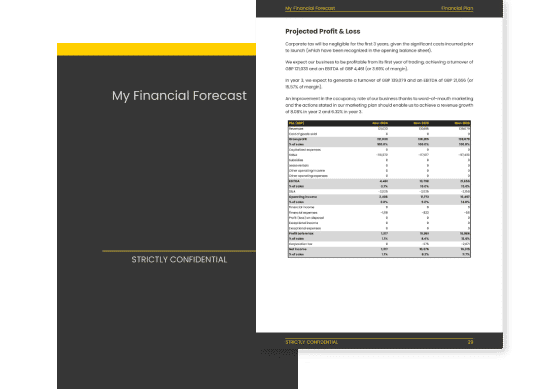
Takeaways
- Having a financial forecast enables you to visualise the expected growth, profitability, and cash generation for your business over the next three to five years.
- Tracking actuals vs. forecast and keeping your financial projections up-to-date is the only way to get a view on what your drama school future cash flows may look like.
- Using financial forecasting software is the mordern and easy way to create and maintain your forecasts.
This is the end of our guide on how to build the financial forecast for a drama school, we hope you found it useful. Don't hesitate to contact us if you want to share your feedback or have any questions.
Need a convincing business plan?
The Business Plan Shop makes it easy to create a financial forecast to assess the potential profitability of your projects, and write a business plan that’ll wow investors.

Also on The Business Plan Shop
- Example of financial forecast
- How to create a turnover forecast for a business?
- Financial forecast for a business idea
Know someone who owns or is thinking of starting a drama school? Share our forecasting guide with them!


